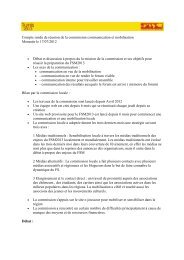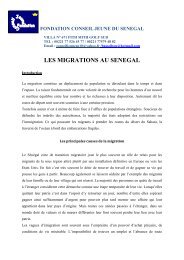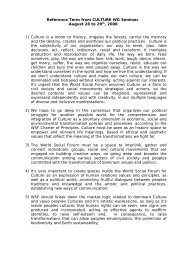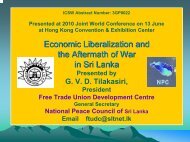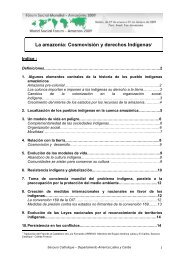Create successful ePaper yourself
Turn your PDF publications into a flip-book with our unique Google optimized e-Paper software.
<strong>Press</strong> <strong>Report</strong> <strong>Europe</strong> <strong>WSF</strong> <strong>2009</strong><br />
IPS: You have quite a positive opinion with respect to the power and influence of NGOs in the world. What is needed to<br />
give them an even greater impact?<br />
HRO: It is a problem of organisation, or of positioning ourselves with regard to what is happening on the ground, and to<br />
how we work with communities, with small farmers, with our beneficiaries in general.<br />
We must reflect the real situation of the beneficiaries. That is the key to everything. We must maintain this link between<br />
the projects and the beneficiaries. This is the way we will continue playing a growing and increasingly important role in all<br />
countries.<br />
WORLD SOCIAL FORUM: "Wake Up, World!" – SOS (IPS)<br />
from the Amazon<br />
By Mario Osava<br />
BELÉM, Brazil, Jan 27 (IPS) - A human banner made up of more than 1,000 people, seen and<br />
photographed from the air, sent the message "SOS Amazon" to the world, in the first action taken by<br />
indigenous people hours before the opening in northern Brazil on Tuesday of the <strong>2009</strong> World Social<br />
Forum (<strong>WSF</strong>).<br />
The mass message reflects "our concern about global warming, whose impact we will be the first to feel,<br />
although we, the peoples of the Amazon, have protected and cared for the forests," Francisco Avelino Batista,<br />
an Apurinán Indian from the Purus river valley in the Brazilian Amazon, told IPS.<br />
"We are raising our voices as a wake-up call to the world, especially the rich countries that are hastening its<br />
destruction," said Edmundo Omoré, a member of the Xavante indigenous community from the west-central<br />
state of Mato Grosso on the border between the Amazon region and the Cerrado, a vast savannah region in<br />
the centre of the country.<br />
Both men belong to the Coordinating Committee of Indigenous Organisations of the Brazilian Amazon (COIAB),<br />
which joined the Quito-based Coordinating Body of Indigenous Organisations of the Amazon Basin (COICA) to<br />
create their "message from the heart of the Amazon."<br />
Nearly 1,300 indigenous people from about 50 countries, although mainly from Brazil, plan to raise the issues of<br />
their rights as original peoples and environmental preservation at this year’s edition of the <strong>WSF</strong>, which runs<br />
through Sunday in Belém, a city of 1.4 million people and the northeastern gateway to the Amazon.<br />
Indigenous people have participated in the <strong>WSF</strong> in previous years, but this time a much larger presence was<br />
sought. The aim was for 2,000 to take part, but transport costs and financial difficulties prevented many<br />
participants from coming from other countries and from remote areas within Brazil itself.<br />
In addition to indigenous groups, original peoples at the <strong>WSF</strong> include Quilombolas (members of communities of<br />
Afro-Brazilian descendants of escaped slaves) and other native peoples.<br />
The key location chosen for the <strong>WSF</strong>, and the various global crises that are occurring, have created "a special<br />
moment" for original peoples to take a leading role, according to Roberto Espinoza, an adviser to the Andean<br />
Coordination of Indigenous Organisations (CAOI).<br />
"A crisis of civilisation" is under way, said Espinoza, who described the serious economic, energy and food<br />
problems, as well as climate change, as part of the same phenomenon.<br />
In this situation, indigenous people should have political participation as of right, not "as folklore or as a merely<br />
cultural contribution," Espinoza, one of the coordinators of the indigenous peoples' presence at the <strong>WSF</strong>, told<br />
IPS.<br />
The Declaration on the Rights of Indigenous Peoples, approved by the United Nations General Assembly, is of<br />
paramount importance here, he said. It should not be seen as a "utopian" document; rather, its provisions<br />
3




